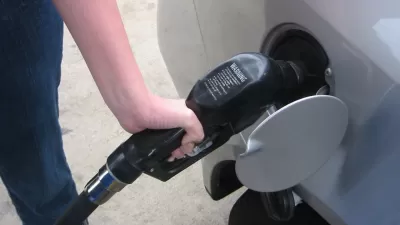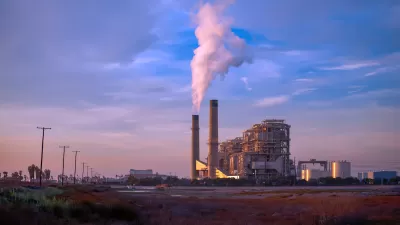The U.S. Environmental Protection Agency and the California Air Resources Board, the nation's two most powerful environmental regulatory agencies, won an important round in federal court last week. But the emissions standards battle may not be over.

Last Tuesday's ruling by the U.S. Court of Appeals for the District of Columbia Circuit has clean air, climate, and electric vehicle advocates breathing easier — at least for now. At stake was the ability of the U.S. Environmental Protection Agency to grant a waiver to California to allow them to set stricter motor vehicle emissions standards as authorized by the Clean Air Act of 1970 and Air Quality Act of 1967.
“The ruling [pdf] by the U.S. Court of Appeals in Washington, D.C., upheld a decision in March 2022 by the Environmental Protection Agency, under President Joe Biden, to restore California’s pollution-setting authority for cars and trucks that had been repealed by the EPA in 2019 under President Donald Trump,” reported Bob Egelko for the San Francisco Chronicle on April 9.
Related SAFE Rule posts during the Trump administration:
- September 19, 2019: California's Ability to Set Auto Emissions Standards to Be Revoked
- September 21, 2019: Did the Outlook for Electric Vehicle Sales in U.S. Just Nosedive?
Red states sue, joined by allied interests
Seventeen states, led by Dave Yost, Attorney General of Ohio, “filed a lawsuit [pdf] in the US Court of Appeals for the District of Columbia Circuit on May 12, 2022, contesting the US Environmental Protection Agency’s (EPA’s) ‘lawflash’ by the Morgan Lewis law firm on May 18, 2022.
California, joined by 19 other states, the District of Columbia, and “the cities of Los Angeles and New York moved to intervene in the lawsuit to defend EPA’s decision to restore the California Waiver.”
Egelko of the Chronicle adds the states “argued that the EPA’s actions interfered with state sovereignty, while oil and gas companies contended climate change was not a ‘compelling and extraordinary condition’ that required California to tighten its emission standards.”
Ethanol and fuel retailing interests also joined the plaintiffs, concerned about the transition in the auto market from liquid fuel to electric power.
“In their arguments, they expressed concerns that this waiver exceeded the statutory authority under the Clean Air Act that provides waiver authority for California pertaining to air pollution standards, not technology mandates,” notes an April 11 news release from the National Association of Convenience Stores (NACS), a trade association representing the convenience and fuel retailing industry.
Three-judge panel sides with EPA
“But the appeals court said the Constitution authorizes Congress, not the states, to regulate interstate commerce, and U.S. lawmakers had done so in 1967 by passing the Clean Air Act,” adds Egelko. “That law allows the EPA to approve a state’s vehicle emission standards as long as they are as strong as the nationwide standards, or stronger, as they are in California.”
Because the oil companies could not show any harm from the current rules, they were not entitled to sue, the court concluded.
“The Court of Appeal’s decision in Ohio v. EPA is probably the single most important case interpreting the scope of California’s section 209(b) waiver authority,” wrote Richard Frank, Professor of Environmental Practice and Director of the U. C. Davis School of Law’s California Environmental Law & Policy Center, on April 12.
Is the decision final?
“The states and the companies could ask the full appeals court for a new hearing or seek review in the U.S. Supreme Court, which ruled in 2022 that the Biden administration had no authority to limit greenhouse gas emissions from coal plants,” adds Egelko.
“The case is all but certain to land before the Supreme Court,” reports Lesley Clark for POLITICO Greenwire on April 9 in a subscription-only article.
It’s already been described as “SCOTUS bait” for raising issues that seem designed to attract the attention of the high court’s conservative wing. Republican-appointed justices in the majority have recently sided with conservative claims against other initiatives from President Joe Biden, including his administration’s vaccine mandate and student loan forgiveness plan.
Correspondent's note: The case, Ohio v. E.P.A. [pdf], decided on April 9 in the D.C. Court of Appeals, should not be confused with a case by the same name currently before the U.S. Supreme Court that also goes by the name, EPA's 'Good Neighbor Plan.' To further confuse matters, both deal with the Clean Air Act, though very different aspects of the landmark environmental law.
Hat tip to POLITICO's California Climate newsletter, April 9.
FULL STORY: Federal court upholds California’s vehicle pollution rules

Montreal Mall to Become 6,000 Housing Units
Place Versailles will be transformed into a mixed-use complex over the next 25 years.

Planetizen Federal Action Tracker
A weekly monitor of how Trump’s orders and actions are impacting planners and planning in America.

DARTSpace Platform Streamlines Dallas TOD Application Process
The Dallas transit agency hopes a shorter permitting timeline will boost transit-oriented development around rail stations.

Study: 4% of Truckers Lack a Valid Commercial License
Over 56% of inspected trucks had other violations.

Chicago Judge Orders Thousands of Accessible Ped Signals
Only 3% of the city's crossing signals are currently accessible to blind pedestrians.

Philadelphia Swaps Car Lanes for Bikeways in Unanimous Vote
The project will transform one of the handful of streets responsible for 80% of the city’s major crashes.
Urban Design for Planners 1: Software Tools
This six-course series explores essential urban design concepts using open source software and equips planners with the tools they need to participate fully in the urban design process.
Planning for Universal Design
Learn the tools for implementing Universal Design in planning regulations.
City of Mt Shasta
City of Camden Redevelopment Agency
City of Astoria
Transportation Research & Education Center (TREC) at Portland State University
US High Speed Rail Association
City of Camden Redevelopment Agency
Municipality of Princeton (NJ)





























